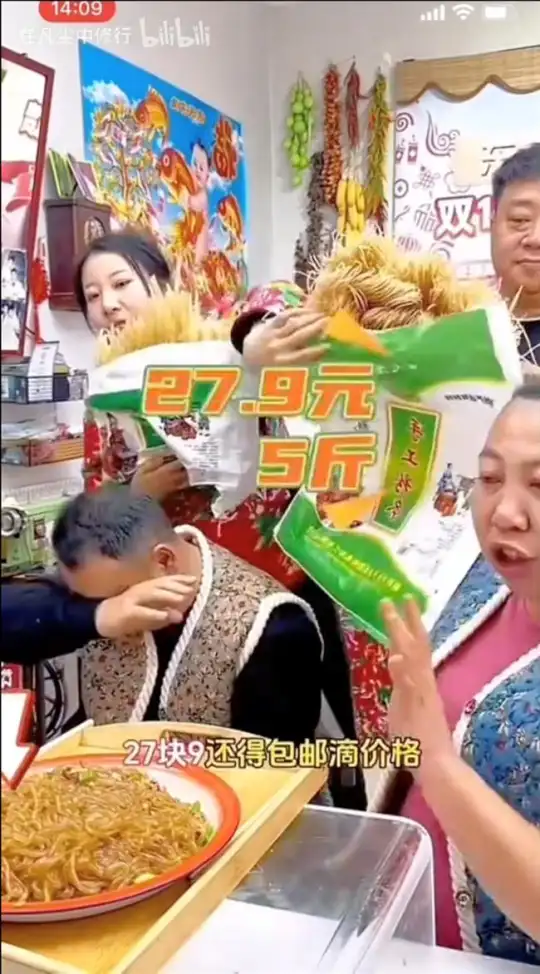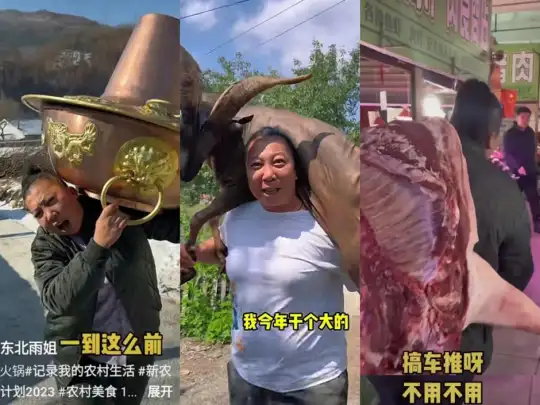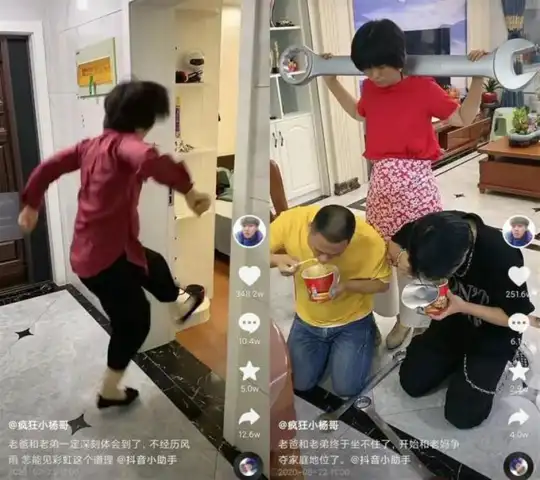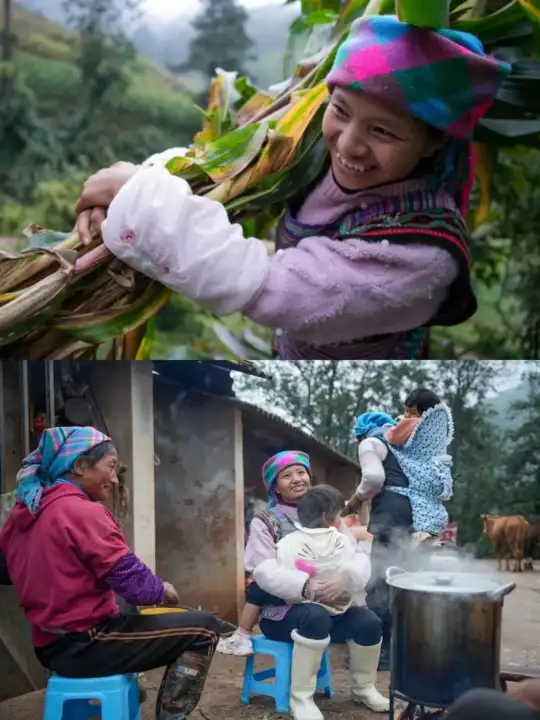For a time, a 27.9 yuan (US$4.30), 5-kilogram bag of "100 percent sweet potato" handmade noodles was selling rapidly during the livestream of Chinese influencer Northeast Sister Yu (东北雨å§).
Nearly 10,000 bags were sold, generating close to 250,000 yuan in sales after just four livestreams in a single month, according to Chanmama data.
But the momentum didn't last. On September 23, two anti-fraud bloggers publicly accused Sister Yu of false advertising, claiming the noodles – marketed as containing only sweet potato starch, water, and alum – were actually mixed with cassava starch and contained no sweet potato at all.
The bloggers also reported being assaulted when they visited her hometown in Benxi County, Liaoning Province, to confront her on September 20.
The allegations quickly caught fire on social media, prompting local regulators to investigate.
On October 12, the local market watchdog confirmed the accusations, fining Sister Yu's company 1.65 million yuan and ordering them to suspend operations for compliance checks.

Ti Gong
Northeast Sister Yu and her team sold handmade noodles in a livestream, claiming they were made with 100 percent sweet potato.
Credibility crisis
Northeast Sister Yu's real name is Chang Xiaoyu. She hails from Benxi County, a rugged part of northeastern China.
True to the spirit of her hometown, she embodies a sense of toughness and resilience.
In her videos, a typical day sees her feeding chickens, ducks, pigs, and rabbits, shoveling snow, chopping wood, stoking the fire, and chatting with her husband Lao Kuai and her crew before cooking a big meal.
Standing at nearly six feet tall, she's known for her strength – swinging heavy pots, hoisting iron kettles over her shoulder, and carrying half a pig with ease. She buys cabbage by the ton and cooks up steaming pots of hearty meals.
Fans say "she's like a warrior from an ancient tribe – you'd never go hungry with her around" and "if there was a zombie apocalypse, Sister Yu would make sure you were well-fed."
People love her boundless energy, saying she burns through in a day what they couldn't manage in a month.
She's become a motivational figure for many young viewers who struggle with morning routines, tuning in to hear her shout commands like "Let's get to work!" hoping to spark some of her drive in their own lives.

Ti Gong
Standing at 1.8 meters, Sister Yu often appears in her videos carrying whole calves, half pigs, or large copper pots, building her image as a tough and powerful figure.
Between late 2022 and early 2023, her following exploded. Her Douyin, the Chinese version of TikTok, gained over 2.2 million followers in just 52 days.
With her popularity came business opportunities, she quickly transitioned to selling products through livestreams.
According to data, since 2024, her 28 livestreams have brought in over 100 million yuan in sales, focusing mainly on food and drink.
Yet, from late 2023 onward, trouble seemed to follow her. Just weeks before the sweet potato noodle scandal, she faced backlash over a video about a crab harvest in Panjin, where the crabs appeared unusually large and clean.
Local viewers pointed out that rice-field crabs in Panjin are typically smaller, often caught at night, and usually covered in hard-to-wash mud – unlike the pristine specimens in her video.
Sister Yu defended the video, explaining that it was filmed during a harvest festival at the invitation of the organizers and that daytime filming was chosen for convenience.
In a follow-up livestream on September 7, she admitted they used crabs from another area because the rice-field crabs were not yet in season. Many saw this as an indirect admission of staging, fueling accusations of deception.
And this wasn't her first controversy. In late 2023, she was criticized for selling what was advertised as northeastern geese, but they were actually African geese, with many complaints about quality. The goose products quietly disappeared from her online store after the scandal.

Ti Gong
Crazy Little Yang Brothers sell Meicheng mooncakes in his livestream , claiming they were made in Hong Kong.
A wave of scandals
Sister Yu's fall from grace is one of many. Several of China's top livestream influencers have recently faced similar "credibility crises."
During this year's Mid-Autumn Festival, 100-million-follower Douyin influencer Crazy Little Young Brothers faced backlash for selling 'Hong Kong-made' Meicheng mooncakes, which were neither produced in Hong Kong nor ever sold there.
Meanwhile, rumors of infidelity began circulating in his personal life, further damaging his public image.
Within just six weeks, he lost 5 million followers.
On September 26, he was fined 68.94 million yuan by authorities in Hefei for "misleading consumers."

Ti Gong
With oversized props, plot twists, and an offbeat style, Crazy Little Young Brothers first gained popularity with comedic videos.

Ti Gong
Yang Zaoying, a 28-year-old woman from rural Xundian County, Kunming, rose to fame by sharing glimpses of her everyday life in the countryside. Known online as Xiaoying, she has attracted over 8 million followers across various social media platforms.
Likewise, another influencer, Xiaoying, found herself at the center of a different kind of scandal.
Like Northeast Sister Yu , she built a following by showing her rural life – endlessly working on the farm, dealing with a difficult husband, and caring for children and livestock.
Viewers saw her as a symbol of perseverance and she quickly amassed 5.67 million followers on Douyin.
But as her popularity grew, so did scrutiny. Investigations revealed that Xiaoying's lifestyle was far more comfortable than her videos suggested. It turned out she owned multiple businesses, and her finances were much more secure than she had led her followers to believe.
She also faced accusations of using videos of "starving cows" to gain sympathy from her audience, with some even alleging she had "abandoned her daughters." These claims shattered her carefully crafted image as a down-to-earth farm woman almost overnight.
In just two days, she lost nearly 100,000 followers.
Many viewers commented that her content seemed less about "sharing a beautiful life" and more about "staging a beautiful life."

Ti Gong
Tingquanjianbao (å¬æ³‰é‰´å®), an influencer known for his antique authentication skills, altered his listed education to "Girls' High School" after facing allegations of faking a degree from Peking University.
Meanwhile, Douyin influencer Tingquanjianbao (å¬æ³‰é‰´å®), with 25 million followers, announced a one-week break amid allegations he faked his degree from Peking University, sparking speculation about the real reason behind his hiatus.
Another rising star on Douyin, K Zong (K总), abruptly paused his streaming after being mysteriously banned three times during his October 13 livestream, leaving fans wondering what really happened.

Ti Gong
In February, influencer Thurman the cat with a cup went viral after claiming to find a Chinese student's homework in Paris. A Hangzhou police investigation later revealed the story was fake. The influencer and the company involved faced penalties, and their accounts, with a combined 40 million followers, were permanently banned from Chinese social media.
Reckoning with the collapse
As the old saying goes, "I watched him build his grand mansion, I watched him host lavish parties, and I watched it all come crashing down."
This year, more than 10 of China's top influencers have faced serious setbacks, each in their own way. Beyond those already mentioned, others with millions of followers – like "Thurman the cat with a cup (Thurman猫一æ¯)," "Luo Wangyu (骆王宇)," and "Seven Stars (七颗猩猩)" – have also seen their reputations unravel.
Yao Suxin, founder of the PR firm AHEAD, explained to Chongqing Morning Post that many influencers rise to fame so quickly that they start to believe that maintaining their popularity is all that matters. As a result, they often overlook the need for risk management.
"In our experience, most influencers and celebrities don't like taking advice," Yao said. "When we bring up risks, they usually say, 'It was fine last time, and others have done it too without any issues.'"
A major factor behind these scandals is the over-construction of persona.
Many influencers gain followers by crafting a specific image, but when reality doesn't match up with their online persona, it creates a sense of betrayal among their fans. Those who once cheered them on can quickly become their harshest critics.
Beyond losing followers, creating a false image for sympathy or attention can also have legal consequences.
Fu Jian, head of Henan Zejin Law Firm, was quoted by the newspaper that influencers like Xiaoying, who create "pity personas" to attract followers, risk sanctions from social media platforms. Using a false backstory for sympathy and sales could be considered false advertising or fraud, leading to civil penalties or fines. If the deception involves large sums, it could even result in criminal charges.
The recent spate of scandals has also drawn attention to broader issues in the livestreaming sales industry, such as unclear accountability for product quality, outdated regulations, and challenges in effectively monitoring digital marketplaces.
Yao suggests regulators focus on high-profile influencers, introduce stricter penalties, and bring in third-party agencies to verify the quality of products before they're promoted in livestreams. Tightening the legal responsibilities of influencers, platforms, and sellers could help prevent future controversies.
With the upcoming Singles' Day shopping festival – China's equivalent of Black Friday – it remains to be seen which influencers will thrive and which ones could face their own downfall.









No comments yet
Be the first to share your thoughts!